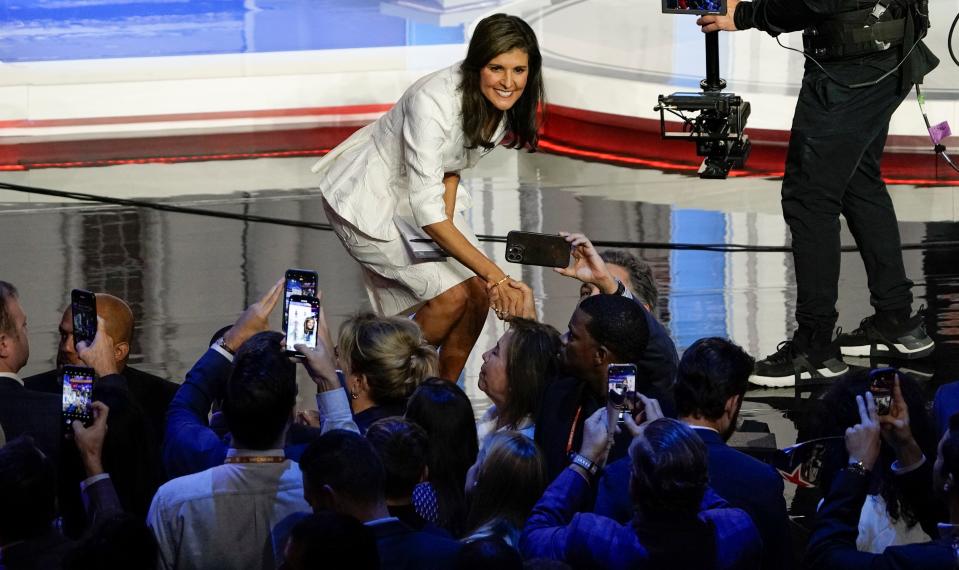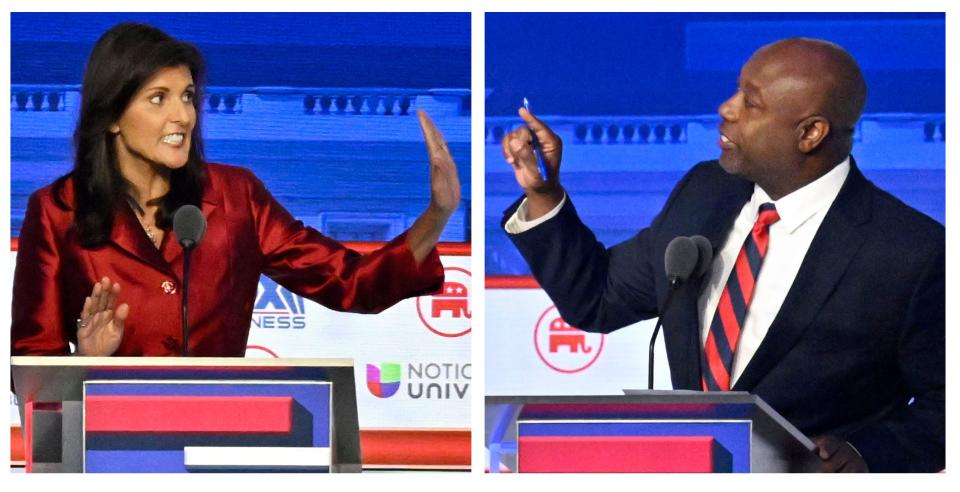A secret weapon in the fight for abortion rights? Fed-up Republican women

Abortion rights proponents may have had a secret weapon ? fed-up Republican women ? when they notched a big win in Ohio last week. Analysts say that could spell trouble for the GOP in 2024.
Ohio’s Issue 1, a hard-fought referendum that enshrined abortion rights in the ruby-red state’s constitution despite the opposition of the state’s powerful Republican party and leading churches, passed Nov. 7 with more than 56% of the vote.
While it’s too soon to have any concrete data, Republican strategist Susan Del Percio said the Ohio ballot measure is a strong indication that some GOP women are breaking from the party on key issues.
A result like Ohio's "doesn't happen unless Republican women also participate,” Del Percio said. “They may not create the high turnout, but they have to be part of the turnout. Otherwise, you can't get those numbers.”
Among the women who turned out in favor of the abortion amendment was Carol Roll, 66, of Green Township, Ohio. Despite typically voting Republican, Roll said she voted for Issue 1 because she feared its defeat would open the door to the government having access to her medical records.
"And I feel if somebody has been raped, they have every right to have an abortion," Roll said.
Nine percent of Republican women, many repelled by Donald Trump, voted for Biden in 2020.
That was the same year lifelong Republican Susan Burrow, 67, said she decided to drop her party affiliation.
The self-described social conservative of Amherst, New Hampshire, says she doesn’t recognize the party that once so closely aligned with her values.
“I don’t want to be a part of it because I feel like it’s lost its mind,” said Burrow.
Many conservative women like Burrow have been jumping the GOP ship or resisting its Trump-ward lurch since the 2016 presidential election, Del Percio said.
Abortion is a point of contention between Republicans and women
Republicans have struggled to find a winning message on abortion since the Supreme Court overturned Roe v. Wade last summer, while analysts say the issue has pushed Democratic – and some pro-choice Republican – voters to the polls.
“What drives people out to vote is how they feel. And women feel that they don't want a right taken away from them," Del Percio said. “Not only taken away from them but decided by mostly male dominated legislatures.”
Burrow, who identifies as “pro-life” or anti-abortion, said she opposes a national restriction and, as a conservative, believes the issue should be left to states to decide.
Kelly Dittmar, director of research at the Rutgers Center for American Women and Politics, said abortion could further fuel discontent that began with Trump’s takeover of the Republican party.
“You look at the fact that the party is losing moderates writ large, especially women moderates,” Dittmar said. “Abortion is just yet another example to them and for some could be the last straw.”
Jennifer Carroll, former Florida lieutenant governor and spokesperson for the conservative women's group Maggie's List, said she believes the outcome of the 2023 election, where abortion was an issue across several states, had more to do with Democrats' effective campaign strategies. In addition to the Ohio abortion result, Democrats held the governor’s mansion in Kentucky and took control of the Virginia state legislature last week.
But some Republicans candidates' more "extreme" agendas could cost them the support of women more interested in a centrist approach, Carroll told USA TODAY.
“If the person seems to be too far left or right, it may be a turn off for some of these Republican women voters, because either they don't want someone that's going to be so far in any corner where they feel that that person is not going to be reasonable,” she said.

Could Haley bring women back to the party?
Though many Republican officials continue to grapple with how to talk abortion, one candidate may have unlocked a winning strategy, at least with conservative women.
Former South Carolina Gov. Nikki Haley has said throughout her campaign that despite being “unapologeticaly pro-life,” she would not push a federal limit given the slim chances of such a measure passing today’s divided Congress.
“She's basically saying, I have a conservative position, but I'm just being pragmatic,” Dittmar said.
“And that's an interesting approach," Dittmar added. “It may well work to attract some moderates, particularly women, who are concerned about the extremism on this issue.”
Like other Republican 2024 presidential candidates hoping to dethrone Trump as party leader, Haley is walking a fine line to appeal to more conservative primary voters without hurting her chances with independents and moderates in the general election, Dittmar said.
Haley’s abortion position “tones her down” in comparison to more “extreme rhetoric,” Del Percio said.
This contrast took center stage last Wednesday when Haley clashed with fellow South Carolinian and then-Republican presidential candidate, Sen. Tim Scott, during the third GOP debate. Scott argued in support of a national 15-week abortion ban.
Haley held firm, telling Scott that she "will sign anything where we can get 60 Senate votes."
“But don’t make the American people think that you’re going to push something on them when we don’t even have the votes in the Senate," she urged. Scott suspended his presidential campaign on Sunday.
Burrow, in New Hampshire, said she plans to support Haley or former New Jersey Gov. Chris Christie, another presidential hopeful who supports leaving abortion to the states. Burrow, a retired electrical engineer, sees both candidates as more experienced and “levelheaded” than others in the contest.
“I want a president that acts like a president,” Burrow said. “The all or nothing, take no prisoners approach to government is a disaster.”

The GOP's identity crisis and voter dissatisfaction
Trump has been the sticking point for many dissatisfied Republican women for almost eight years, as the GOP shifts to following “a person rather than principles,” Del Percio said.
“The Republican Party right now has moved very Trump, but that's not necessarily conservative,” she said.
Burrow fears the GOP is creeping toward more “extremist” views espoused by some of its newer political figures and moving away from “the real sense of what conservatism used to mean.”
And it's not just the former president.
“When people like Marjorie Taylor Green associate themselves with conservatives, it just grates on me,” Burrow said of the Georgia congresswoman. “I think of a conservative as someone that knows how to speak, has a vocabulary, has reason and didn’t incite people to violence.”
Still, conservative women’s dissatisfaction isn’t a surefire win for Biden or Democrats next November. Republican women have soured on the current president, Del Percio said.
“One of the problems Biden has is the real swing voter of a Republican, and mostly women who voted for him in 2020 because they really just couldn't take Trump ? they don't like Biden now,” she said. “So the question is, will they vote?”
Despite their dissatisfaction with Biden, Del Percio said issues like abortion could mobilize disillusioned Republican women.
“The biggest challenge when trying to get women to come out in 2024 will be enthusiasm," Del Percio said. "There's no doubt about it, Republican women who were open to Biden in 2020, the Biden campaign has to hope that they don't stay home. Which is why the ballot initiatives help."
Cincinnati Enquirer reporter Scott Wartman contributed to this story.
This article originally appeared on USA TODAY: Ohio election results may show Republican women breaking with party